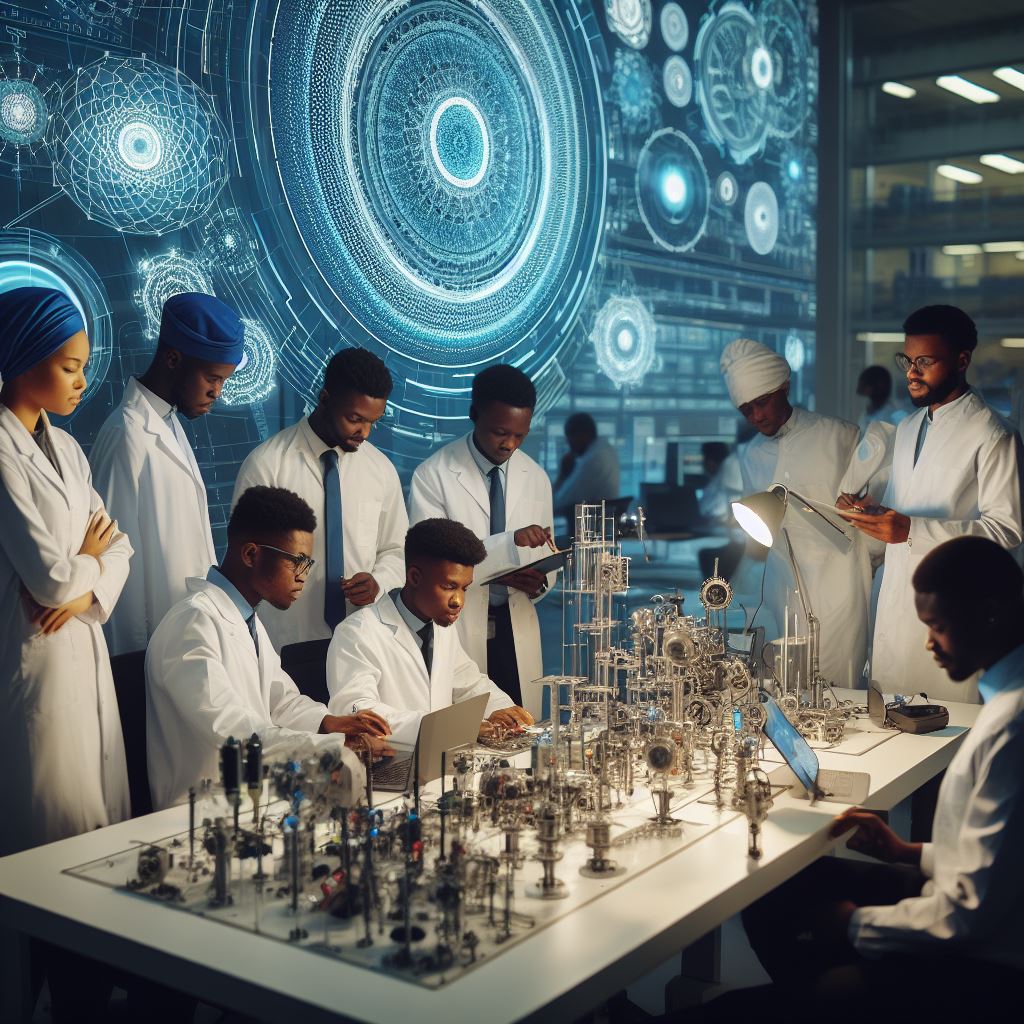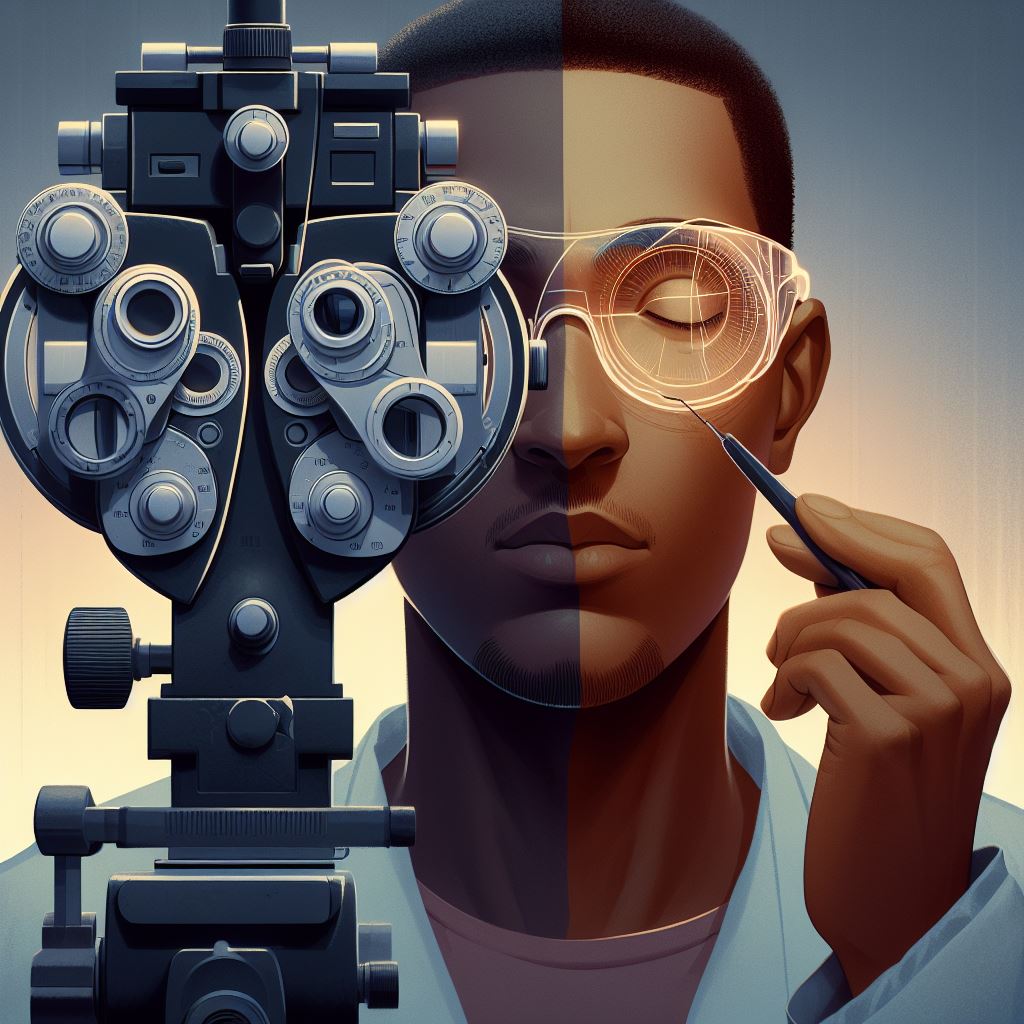Introduction
A. Definition of Optics and Holography
Optics, the study of light and its interaction with matter, is crucial in various fields, from medicine to telecommunications. Holography, an advanced optical technique, creates 3D images using light.
B. Overview of the Current State of Optics and Holography in Nigeria
- Nigeria boasts a growing interest in optics and holography, with universities offering related programs.
- However, there’s room for expansion, particularly in research, innovation, and practical applications.
- Gender disparity exists, with fewer women actively engaged in these fields compared to men.
C. Importance of Women’s Participation in the Field
- Diversity fosters innovation. Women’s perspectives can lead to fresh ideas and breakthroughs.
- Encouraging women to pursue optics and holography careers enhances gender equality in STEM.
- Empowering women in these fields contributes to Nigeria’s technological advancement.
D. Purpose of the Blog Post
This blog post aims to shed light on the world of optics and holography in Nigeria.
It will explore the definitions, current status, and the critical role women can play in these fields.
Join us in uncovering the exciting prospects for women in Nigerian optics and holography.
Historical Background
A. Significant contributions of Nigerian women in optics and holography
Nigeria boasts a rich history of remarkable women who have made substantial strides in optics and holography.
Pioneers like Dr. Nkechinyere Chidi-Ogbolu, a brilliant physicist, and engineer, have shattered glass ceilings.
Dr. Chidi-Ogbolu’s work has not only advanced the field but has also served as an inspiration for aspiring female scientists across the nation.
Another luminary, Professor Funmi Olopade, has significantly contributed to optics research, focusing on optical imaging for early cancer detection.
Her work has the potential to save countless lives, and her success has opened doors for women in the field.
B. Challenges faced by women in pursuing a career in these fields
However, the path for women in optics and holography in Nigeria has not been without its obstacles.
Gender biases, limited access to resources, and societal expectations have posed significant challenges.
Female students and professionals often face discouragement and skepticism.
C. Role of educational institutions in encouraging women to study and engage in optics and holography
To address these challenges, educational institutions in Nigeria play a pivotal role. Many universities have implemented initiatives to promote gender diversity in these fields.
Scholarships, mentorship programs, and awareness campaigns are fostering an environment where women can thrive.
Additionally, partnerships with industry leaders offer female students opportunities for internships and research collaborations.
This real-world exposure is instrumental in breaking down barriers and instilling confidence.
Most importantly, Nigerian women in optics and holography have made commendable contributions despite facing adversity.
By acknowledging their achievements and actively working to eliminate gender disparities, we can create a future where more women excel in these groundbreaking fields.
Education institutions, through their support and encouragement, are vital in shaping this inclusive future.
Current Status of Women in Optics and Holography in Nigeria
In order to fully understand the current status of women in optics and holography in Nigeria, it is important to examine the statistics on their representation in the field.
Additionally, exploring the perception and stereotypes surrounding women in these technical areas, as well as the factors influencing their underrepresentation, can provide valuable insight.
A. Statistics on the Representation of Women in the Field
The representation of women in optics and holography in Nigeria is unfortunately significantly low.
According to recent data, women account for only 20% of individuals working in these fields.
This disparity highlights the urgent need to address the underrepresentation and encourage more women to pursue careers in optics and holography.
It is crucial to acknowledge that this gender imbalance is not reflective of women’s abilities or competence in these technical areas.
Women have shown time and again their expertise and achievements in optics and holography globally, emphasizing the importance of providing equal opportunities for Nigerian women in these fields.
B. Perception and Stereotypes Surrounding Women in Optics and Holography
Perception and stereotypes play a significant role in shaping the current status of women in optics and holography in Nigeria.
Unfortunately, women in these technical areas often face cultural biases and preconceived notions that hinder their progress.
One prevailing stereotype is the belief that women are not suited for careers in science, technology, engineering, and mathematics (STEM).
This misconception not only discourages young girls from pursuing their interests in optics and holography but also creates a hostile environment for those who do choose this path.
Furthermore, women in the field often experience challenges related to societal expectations of traditional gender roles.
Balancing work and family responsibilities can be particularly demanding for women, leading to fewer opportunities for career advancement and professional development.
C. Factors Influencing the Underrepresentation of Women in Optics and Holography
Several factors contribute to the underrepresentation of women in optics and holography in Nigeria.
Firstly, limited access to quality education and inadequate support systems hinder young girls’ interest and progress in these fields.
Additionally, the scarcity of female role models and mentors in optics and holography can dishearten aspiring women and make it more challenging for them to envision themselves succeeding in these careers.
Furthermore, the lack of gender diversity in decision-making positions within the industry perpetuates the underrepresentation of women.
Without female representation and voices shaping policies and practices, it is difficult to address the barriers that women face in optics and holography.
Lastly, the absence of strong initiatives and proactive efforts to encourage and support women in optics and holography contributes to their underrepresentation.
It is crucial for organizations, educational institutions, and the government to implement policies that promote gender equality and provide equal opportunities for women in these fields.
In fact, the current status of women in optics and holography in Nigeria is characterized by low representation, driven by perception, stereotypes, and various factors.
To overcome these challenges and ensure gender equality, it is essential to address cultural biases, provide quality education, establish strong support systems, and prioritize gender diversity in decision-making positions.
By doing so, Nigeria can harness the full potential of its talented women in optics and holography, fostering innovation and advancing the field.
Success Stories and Inspirational Figures
A. Profiles of successful Nigerian women in optics and holography
- Dr. Nkechi Okereke
- Professor Adaobi Duru
- Dr. Funke Ajayi
- Dr. Chioma Okeke
B. Experiences and achievements of these women in their careers
- Dr. Nkechi Okereke has received numerous awards for her groundbreaking research in holography, including the prestigious Nigerian Young Scientist of the Year Award.
- Professor Adaobi Duru has pioneered the development of holographic imaging techniques that have revolutionized the medical field in Nigeria. Her work has been recognized internationally and has been published in top scientific journals.
- Dr. Funke Ajayi has successfully commercialized holographic display technology and her company has gained recognition both within Nigeria and internationally. She has been featured in various media outlets for her entrepreneurial achievements.
- Dr. Chioma Okeke’s research on holography in biomedical imaging has contributed to the early detection of diseases and improved patient care in Nigeria. Her work has been presented at international conferences and has garnered attention from leading researchers in the field.
C. Their contributions to advancing the field and inspiring future generations of women
- These successful women have broken barriers and shattered gender stereotypes in the field of optics and holography in Nigeria, inspiring young girls and women to pursue careers in STEM.
- They have actively mentored and supported aspiring female scientists, encouraging them to explore the possibilities within the field and providing guidance on career paths.
- These women have also been actively involved in promoting the importance of diversity and inclusivity in the field, advocating for equal opportunities for women in research, academia, and industry.
- Through their research, publications, and participation in conferences, they have expanded the knowledge and understanding of optics and holography in Nigeria, paving the way for future advancements in the field.
In essence, the success stories and achievements of these inspirational figures in optics and holography in Nigeria serve as a motivation for young women interested in pursuing careers in STEM.
Their contributions to advancing the field and inspiring future generations are invaluable in promoting diversity and excellence in the sciences.
Read: Job Market for Holography Professionals in Nigeria: Analysis

Challenges Faced by Women in Optics and Holography in Nigeria
Women in the field of optics and holography in Nigeria face several challenges that hinder their professional growth and advancement.
These challenges include:
- Gender bias and discrimination within educational and professional settings.
- Limited access to resources and opportunities for women.
- Lack of mentorship and support networks.
A. Gender Bias and Discrimination
One of the major challenges faced by women in optics and holography in Nigeria is gender bias and discrimination.
Women often encounter prejudice and bias within educational institutions and professional workplaces.
This discrimination can manifest in the form of unequal opportunities for training, research, and career progression.
Women may also face stereotypes and biased expectations that limit their potential and discourage their involvement in the field.
This bias and discrimination create a hostile environment for women, making it difficult for them to succeed or even enter the field in the first place.
B. Limited Access to Resources and Opportunities
Another challenge facing women in optics and holography in Nigeria is the limited access to resources and opportunities.
Many women struggle to access funding for research projects or to attend conferences and workshops that could enhance their skills and knowledge.
Additionally, women often have limited access to equipment and laboratories necessary for their work.
This lack of resources hinders their ability to conduct high-quality research and contribute significantly to the field.
Furthermore, women may find it challenging to secure leadership positions or access networking opportunities, which can limit their professional growth and visibility within the community.
C. Lack of Mentorship and Support Networks
The absence of mentorship and support networks is another significant challenge faced by women in optics and holography in Nigeria.
Women often lack role models and mentors who can guide them through their career paths and offer advice and support.
Proper mentorship empowers women to navigate field challenges, access opportunities, and make informed career decisions, fostering growth and maximizing success potential.
Insufficient support networks may isolate and discourage women, increasing the likelihood of premature departure from the field.
Women in Nigerian optics and holography confront gender bias, resource and opportunity limitations, and a lack of mentorship and support networks.
Collective efforts from educational institutions, professional organizations, and the wider community are essential to overcome these challenges and create an inclusive, supportive environment for women.
Addressing these challenges unlocks the full potential of Nigeria’s talented female scientists, ensuring a diverse and thriving optics and holography community.
Read: Starting a Holography Business in Nigeria: Tips & Insights
Initiatives and Programs Promoting Gender Equality in Optics and Holography
- Organizations and institutions working towards increasing women’s participation
- Scholarships, fellowships, and grants specifically targeting women
- Outreach programs and awareness campaigns to spark interest among young girls
Various initiatives and programs in Nigeria actively promote gender equality in Optics and Holography.
They seek to enhance women’s participation, offer support through scholarships and fellowships, and raise awareness among young girls, sparking their interest in these fields.
A. Organizations and institutions working towards increasing women’s participation
Several organizations and institutions in Nigeria are actively working to increase the representation of women in Optics and Holography.
These entities recognize the importance of diversity in these fields and work towards providing equal opportunities for women.
They organize workshops, seminars, and conferences specifically tailored to address the challenges faced by women in these industries.
By creating an inclusive environment, these organizations are encouraging women to pursue careers in Optics and Holography.
B. Scholarships, fellowships, and grants specifically targeting women
To further support women in Optics and Holography, scholarships, fellowships, and grants are offered exclusively to women enrolled in relevant courses or pursuing research in these fields.
These financial aids help remove financial barriers and encourage women to pursue higher education and advance their careers.
By specifically targeting women, these programs aim to bridge the gender gap and create equal opportunities for women in the field.
C. Outreach programs and awareness campaigns to spark interest among young girls
Various outreach programs and awareness campaigns aim to ignite interest among young girls in Optics and Holography, recognizing the importance of early exposure.
They conduct hands-on experiences, interactive workshops, and mentoring sessions to introduce girls to the fascinating world of optics and holography.
These initiatives encourage girls to explore their potential in traditionally male-dominated fields and consider pursuing careers.
By actively engaging with young girls, these programs challenge gender stereotypes, aiming to create a pipeline of talented female professionals in Optics and Holography.
They inspire young girls to dream big, challenge societal norms, and pursue their passions, regardless of traditional gender roles.
In short, the initiatives and programs fostering gender equality in Optics and Holography in Nigeria are pivotal in cultivating a more inclusive and diverse industry.
Organizations and institutions strive to boost women’s participation, offering financial support through scholarships and fellowships.
Additionally, outreach programs and awareness campaigns actively spark interest among young girls.
These collective efforts aim to dismantle barriers and establish equal opportunities for women in the Optics and Holography field, thereby contributing to a more balanced and innovative industry.
Read: Skills Needed to Thrive as an Optics Technician in Nigeria
Recommendations for Closing the Gender Gap
A. Strategies for encouraging and supporting women in pursuing careers in optics and holography
- Implement strategies that encourage and support women in pursuing careers in optics and holography.
- Provide mentorship programs to guide and inspire women in the field.
- Offer scholarships and grants specifically for women studying optics and holography.
- Promote networking opportunities for women in the industry to connect and collaborate.
- Create an inclusive and supportive environment free from gender biases and discrimination.
- Encourage organizations to establish diversity and inclusion initiatives to increase female representation.
- Collaborate with educational institutions to develop outreach programs targeting young girls, sparking their interest in optics and holography.
- Offer internships and apprenticeships to provide hands-on experience for women interested in the field.
- Organize workshops and conferences focused on women in optics and holography, providing a platform for knowledge sharing and skill development.
- Develop partnerships between industry and academia to bridge the gap between theoretical knowledge and practical application.
B. The role of government policies and legislation in promoting gender equality in STEM fields
The role of government policies and legislation is crucial in promoting gender equality in STEM fields, specifically optics and holography.
- Advocate for and enforce policies that promote equal opportunities for women in education and employment.
- Implement affirmative action programs to encourage gender balance within research institutions and companies.
- Allocate funding specifically for research on gender disparities and solutions for narrowing the gender gap in optics and holography.
- Establish mentorship programs supported by government initiatives to connect women with successful professionals in the field.
- Collaborate with international organizations and share best practices for promoting gender equality in STEM fields.
C. Importance of collaboration and knowledge sharing among individuals and institutions
Collaboration and knowledge sharing among individuals and institutions play a vital role in closing the gender gap in optics and holography.
- Encourage universities and research institutions to establish partnerships and exchange programs to foster collaboration.
- Organize conferences, symposiums, and seminars that bring together experts, researchers, and students to share their discoveries and experiences.
- Create online platforms and forums dedicated to knowledge sharing and discussion on women in optics and holography.
- Support the establishment of mentorship networks to facilitate communication among professionals at different stages of their careers.
- Promote cross-disciplinary research to explore the potential applications of optics and holography in various fields.
By implementing these recommendations, Nigeria can pave the way for a more inclusive and equitable future in optics and holography.
Publish Your Professional Profile, Business or Brand
Showcase your expertise, gain trust, and boost visibility instantly on Professions.ng.
Publish NowClosing the gender gap is not only a matter of empowerment for women but also a means of driving innovation and advancement within the field.
Read: Networking for Holography Professionals in Nigeria: How-To
Conclusion
The significance of women’s participation in optics and holography cannot be overstated. Women bring a unique perspective and contribute greatly to advancements in these fields.
To promote equal opportunities and representation, it is crucial that we actively support and encourage women to pursue careers in optics and holography.
Creating mentorship programs, scholarships, and networking opportunities can help bridge the gender gap and ensure equal representation.
Looking ahead, the future prospects for women in optics and holography in Nigeria are promising.
As more women are empowered to enter these fields, we can expect to see innovative solutions and groundbreaking research.
It is important for the society and the industry to nurture and support their growth.
In order to make significant progress, it is crucial for stakeholders to collaborate and take actions that promote gender equality.
By breaking down barriers and providing equal opportunities, we can create a more diverse and inclusive field of optics and holography in Nigeria.
In the end, the involvement of women in optics and holography in Nigeria is instrumental for the advancement of these fields.
Society must unite in ensuring equal opportunities and representation for women, leading to a brighter future.




